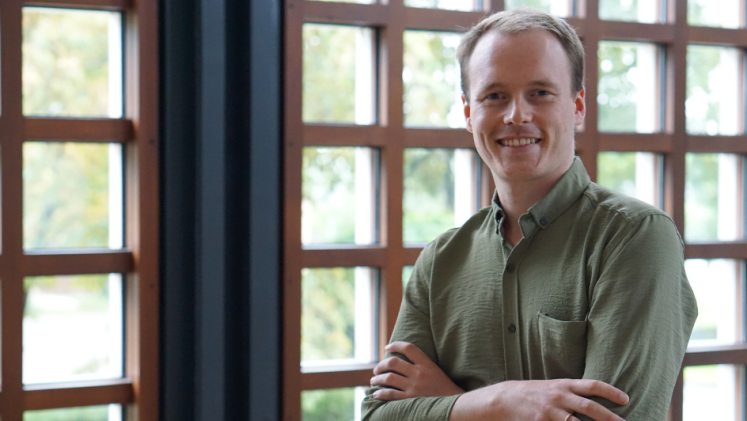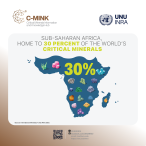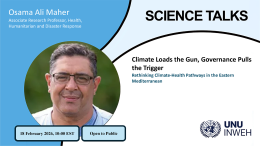For the third time in the past five years a former student from the Master's programme in Geography of Environmental Risk and Human Security has won the German Committee for Disaster Risk Reduction (DKKV) Promotional Award. Taking home first place this year is Fabian Rackelmann for his thesis on the integration of forest health aspects in flood risk reduction.
Among the many photos from the harrowing Ahr Valley floods in Germany in 2021, it is hard to miss the trees, logs and debris that flowed down the Ahr River and contributed to clogging up bridges and other infrastructures. This created critical choke points, causing water to flow outward, spilling into communities on the banks of the river.
“The floods were horrible and as a student learning about disaster risk reduction and ecosystems, I recognized maybe there is a way to learn from it,” said Rackelmann.
The deadwood that gets carried in floods is often in focus in post-flood discourses. However, as deadwood is also an essential part of forest health, Rackelmann wanted to look at it from a disaster risk reduction perspective. In doing so, he needed to understand forestry management goals in terms of forest health versus flood risk reduction. He looked at how forests influence flood risk through the discharge of water from the landscape into channels, and how the characteristics of these channels are shaped by the forest’s condition.
While he carried out the bulk of his research with a literature review and expert interviews, the proximity of Bonn to the Ahr valley allowed him to take field visits for his research. In the field, he observed forest structures, channel slopes as well as infrastructure such as forest roads and drainages to understand how water is retained and transported.
Rackelmann found that in places with no infrastructure that could potentially be damaged, deadwood has a relatively low hazard impact. Forestry management practices should support the deadwood due to its ability to absorb water and influence the direction of water run-off. Adversely, he found that in places with or in close proximity to infrastructure, the hazard impact might be higher, but to certain degrees. For instance, in places with large deadwood and vegetation that can potentially be uprooted during flood events like trees, the risk should be reduced - but in a manner that takes into accounts its natural support to slopes and embankments. In areas where the risk of clogging during floods is too high, he found that selective removal or shortening large deadwood should be considered.
During his research, Rackelmann spoke to forest managers, civil engineers and water managers in the area, all whose work somewhat touch. Through his interviews, he discerned that they are all interested in keeping water inside the forests but that this objective is often impeded by other interests and limitations, such as financial considerations, or limited capacities, pinpointing a gap in flood risk reduction.
“There are some barriers to this, such as financing. However, all sides were interested in my research and this particular finding. Now, they want to unlock ways to integrate their objectives and to work together,” he said.
It is a positive signal for Rackelmann, who has published the first half of his thesis in an academic journal and will do so for the second half too. This part will focus on water retention and forest health, to see how water can best be absorbed and stay in forests.
Rackelmann added his name to a list of alumni who have won the award in previous years. Dominic Sett and Jana Frischen won the award for their theses in 2019 and 2020.
“It feels great to have my work honored in this way and I hope it provides some food for thought regarding more holistic forest and flood risk management,” said Rackelmann, after receiving his award at an award ceremony in Berlin this week. "I am proud to be listed next to other former students from the master programme."
Joining Rackelmann in the top three this year is alumna Angela Marie Bungert, who placed third for her thesis on the role of disaster risk reduction in secondary education for community resilience.
The application period for the Master’s programme is currently open and will close on 15 December. To learn more about the programme and to apply click here.





